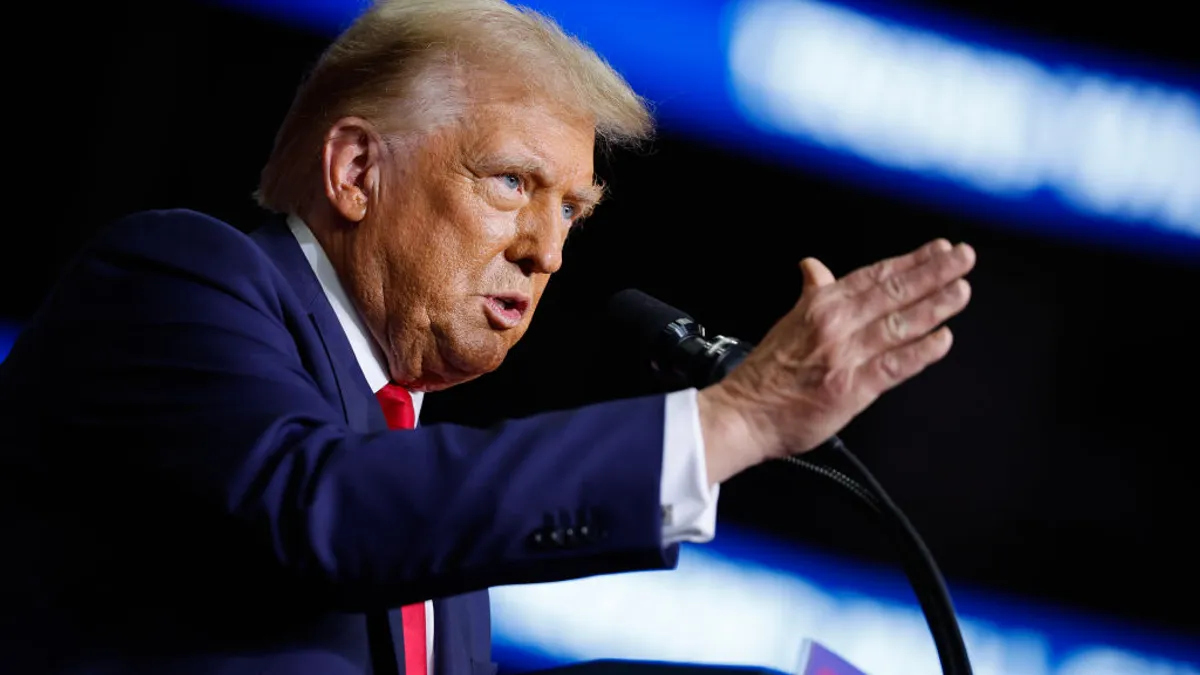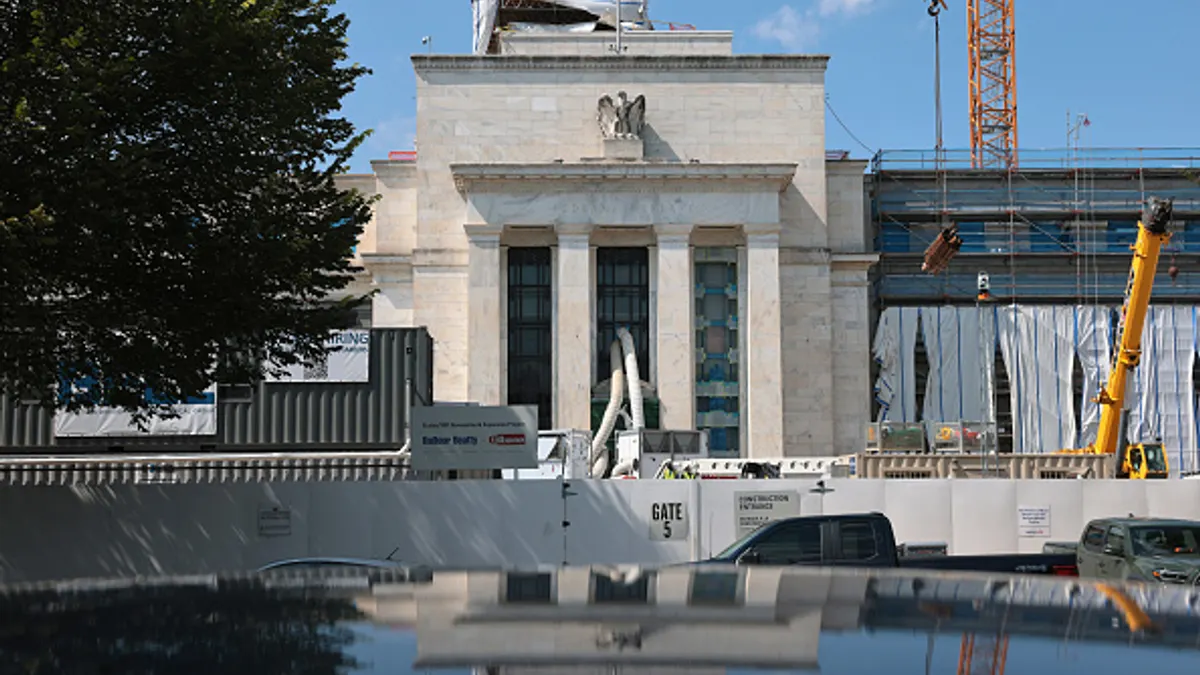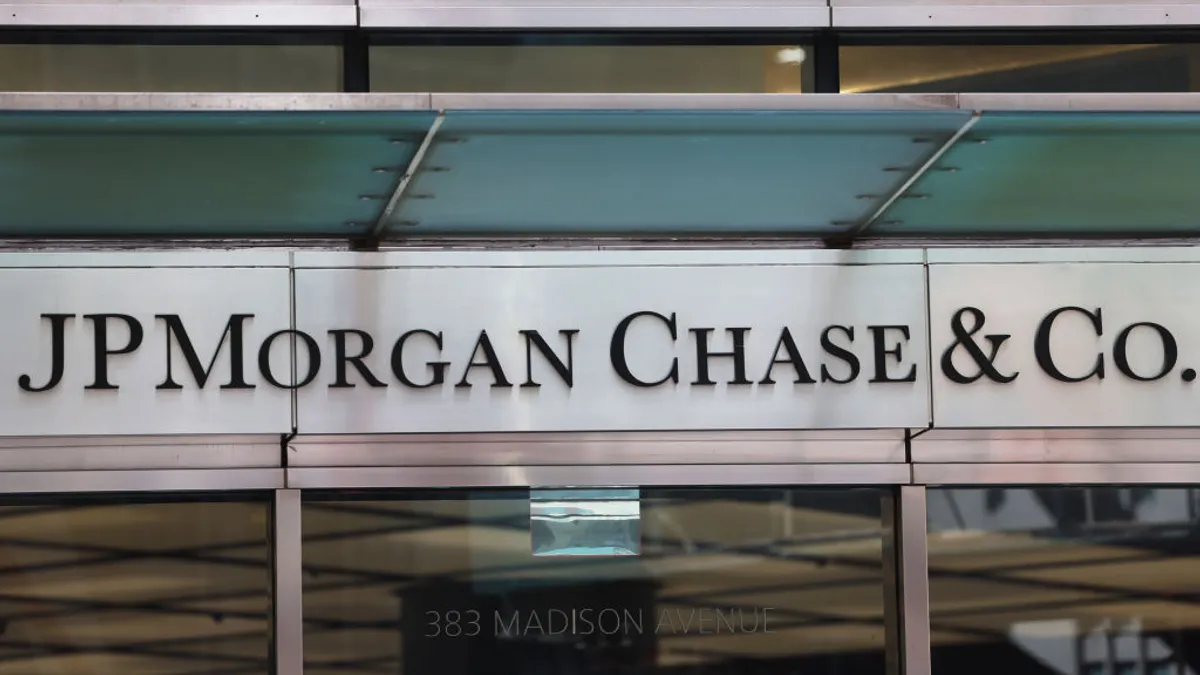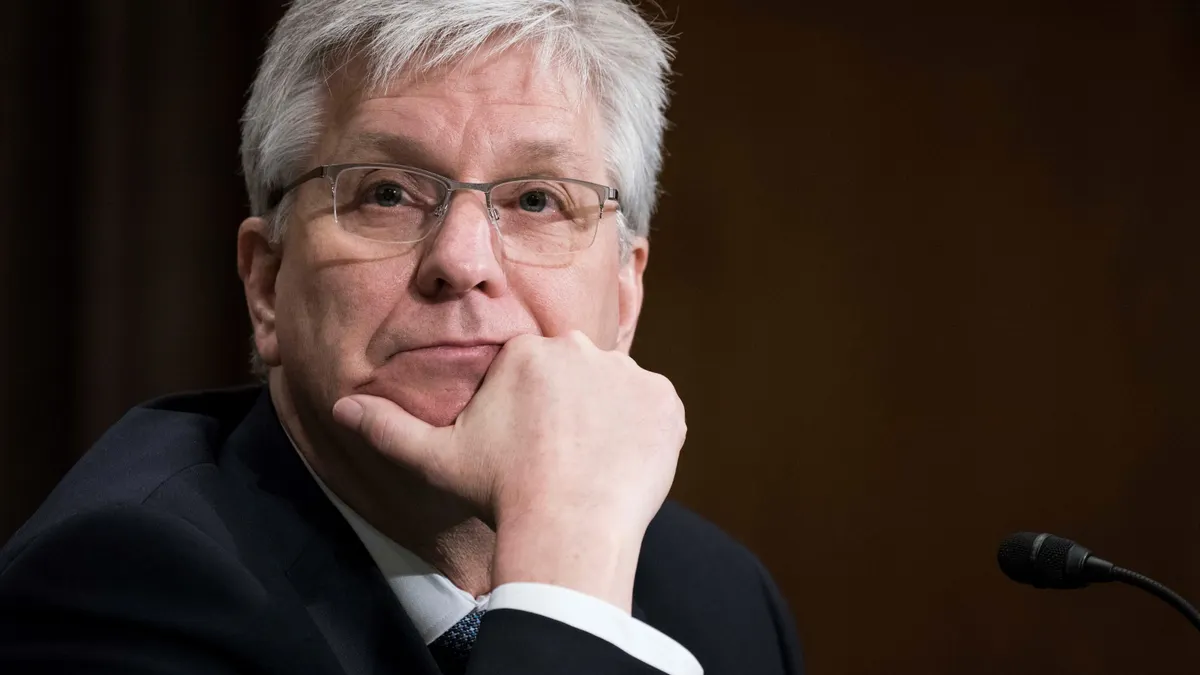A second Donald Trump presidency is likely to have major ramifications for the bank regulatory world. Maybe chief among them: an about-face on the contentious capital requirements hike.
Change is also expected to occur quickly: Trump’s transition team is more experienced and knowledgeable than that of his previous administration, said Peter Dugas, executive director of financial services consulting firm Capco, so Trump is likely to act swiftly to implement policy changes related to the Basel III endgame, mergers and acquisitions, artificial intelligence and ESG.
Additionally, Trump’s second term is almost certain to mean changes at regulatory agencies. The Federal Reserve, the Federal Deposit Insurance Corp., the Office of the Comptroller of the Currency, the Securities and Exchange Commission and the Consumer Financial Protection Bureau are all expected to see exits of high-profile leaders.
“Regardless of Trump's actions, we may see some current appointees decide they would prefer not to serve out their terms in a Trump Administration,” Michele Alt, co-founder and managing director at financial services advisory and investment firm Klaros Group, wrote in an email.
Here are a few of the efforts and people whose time may be waning — at least in their current capacity.
1. Capital requirements
The compromise to save a much-maligned increase in capital requirements for the U.S.’s largest banks appears to be for naught.
Regulators led by the Federal Reserve’s vice chair for supervision, Michael Barr, in September, pitched a proposal that included a 9% boost to the amount banks would be forced to hold. That’s less than half the 19% jump regulators sought in the proposal’s first iteration in July 2023. But the revamp suffered a lack of support from the Fed’s agency partners — particularly, the FDIC.
The FDIC board’s two Republicans, Jonathan McKernan and Vice Chair Travis Hill, vocalized their preference for the proposal to be withdrawn — which would have pushed the timeline for reproposal past the Biden administration’s end date.
But the death knell for capital requirements likely came from a Democrat. CFPB Director Rohit Chopra, also an FDIC board member, privately described the compromise on capital requirements as somewhat of a giveaway to Wall Street banks, Bloomberg reported. But Chopra’s refusal to back the proposal meant it would never gain the backing of the majority of the board.
With less than two months until a new Congress comes into session, even if the proposal were to get that majority and become final, a newly convened Senate in January could pull back the rule through the Congressional Review Act’s 60-day window.
Ultimately, it’s not likely the proposal will be able to move forward, Dugas said. The rule could be re-proposed in a “substantially different” way, or Trump may look to withdraw from the Basel III accord, he said.
Banks and conservative lawmakers have largely blasted the proposed uptick in capital holdings, with Rep. Andy Barr, R-KY, calling Democrats’ beat-the-clock mentality on regulation “clumsy at best and politicized at worst.”
In recent comments, JPMorgan Chase CEO Jamie Dimon said “a lot” of the proposed tweaks to capital requirement “[aren’t] justifiable,” adding that he would prefer a new proposal “so at least we get to see it and start to comment on it.”
2. Federal Reserve changes
Michael Barr’s term as vice chair for supervision doesn’t expire until July 2026, but those who’ve recently served in that position have resigned after a president from the opposing party wins an election.
“Democrat-appointed Vice Chair for Supervision Dan Tarullo resigned shortly after Trump’s inauguration,” Michael Feroli, JPMorgan Chase’s chief U.S. economist, wrote last month, according to Bloomberg. “Likewise the Republican-appointed Randy Quarles resigned shortly after Biden’s election.”
If Barr follows suit, “then the new president could quickly influence regulatory policy, even if his influence over monetary policy is less immediate,” Feroli said.
Still, Barr’s term as a Fed governor extends until January 2032.
The most likely candidate to replace Barr is Fed Gov. Michelle Bowman, given her qualifications, experience and Senate confirmation, Dugas said.
Trump has already indicated he won’t name Jerome Powell to another term as Fed chair; Powell’s term expires in May 2026.
Trump’s been a frequent critic of Powell’s, and has suggested he could fire Powell if reelected. But Trump also told Bloomberg in July he would permit Powell to serve out his term as Fed governor through January 2028, “especially if I thought he was doing the right thing.”
By law, Fed governors can’t be kicked out without cause. Ultimately, “no president has ever attempted to replace a Fed chair, but such an attempt cannot be ruled out,” Feroli wrote.
Replacing Barr, rather than ousting Powell, will be a priority for Trump, Dugas said.
3. FDIC nominee Christy Goldsmith Romero
With Trump’s reelection, Republicans no longer have an incentive to consider the Biden administration’s nominee to be the next FDIC chair.
Goldsmith Romero, a commissioner with the Commodity Futures Trading Commission, saw a grilling from the Senate Banking Committee hearing in July, and at the time, there seemed little objection to her, apart from warnings by Republicans that they’d be watching her handling of the agency’s reputational recovery.
FDIC Chair Martin Gruenberg agreed to resign in May — months after damning allegations that the agency tolerated a toxic culture rife with sexual harassment. But Gruenberg added that he wouldn’t leave the post until the Senate confirms a successor.
Trump’s win means Gruenberg likely resigns or is fired on Day 1 of the president’s new term. That leaves Hill, the FDIC’s Republican vice chair, as the presumed front-runner to succeed Gruenberg. A number of nominees could be put forth, though, and as Republicans gain control of the Senate, Trump will be in a position to act on his preferences, Dugas said.
4. SEC, CFPB, OCC leadership changes
Trump’s election to a second term is sure to spell the end of leadership terms for SEC Chair Gary Gensler and the CFPB’s Chopra.
Trump has pledged to fire Gensler on Day 1. The president-elect told the crowd at a cryptocurrency conference in July he’d appoint a new SEC chair “who believes that America should build the future, not block the future,” and end the current administration’s “anti-crypto crusade.”
Still, removing Gensler may not be possible, since legal precedent curtails a president’s ability to replace commissioners of independent agencies without cause, Tonya M. Evans, Penn State law professor, wrote in Fortune in August.
Trump hasn’t been as vocal about Chopra, but given Chopra’s tough stance on a number of issues, he “may not be there for the long haul,” said Kent Belasco, director of Marquette University’s commercial banking program, in an email.
The president has the ability to fire the CFPB’s director at will. But the agency saw a power struggle during Trump’s first term. When Democrat-appointed CFPB Director Richard Cordray resigned, some assumed leadership would pass to the agency’s newly named deputy director, Leandra English. But Trump named Office of Management and Budget Director Mick Mulvaney to the post. English sued in response, and lost.
Project 2025, a conservative initiative published by the Heritage Foundation, suggested overhauling the CFPB’s leadership and giving the president more control over the agency’s operations, although Trump has tried to distance himself from the plan.
“I don't see evidence that Mr. Trump is interested in dismantling the CFPB,” Ed DeMarco, president of the Housing Policy Council and a former acting director of the Federal Housing Finance Agency, told American Banker last month. “The President and his senior staff will certainly have a directional view regarding CFPB and we can expect that would be reflected in their nominee for CFPB Director.”
Acting Comptroller Michael Hsu, who’s not been confirmed by the Senate, is likely to be replaced quickly once Trump takes office, Dugas noted.
5. Sen. Sherrod Brown, D-OH
Republican challenger Bernie Moreno defeated Brown, the Senate Banking Committee’s chairman, on Tuesday. Beyond that, Democrats lost their razor-thin majority in the Senate. That means a Republican will lead the Senate banking panel — and presumably, front-runner status will go to ranking member Sen. Tim Scott, R-SC, unless Trump offers him a Cabinet post and he accepts.
But the race for ranking member is also up in the air because the panel’s longest-serving Democrat, Sen. Jon Tester of Montana, also lost his reelection bid Tuesday.
That leaves Sen. Jack Reed, D-RI, next by seniority. But Reed is largely expected to remain the top Democrat on the Senate Armed Services Committee. Sen. Mark Warner, D-VA, would be next in line, followed by Sen. Elizabeth Warren, D-MA.
6. Open banking
In contrast to the other names on this list, CFPB’s recent open banking final rule appears to be safe, in the immediate sense.
Banking trade groups largely pushed back against the measure to expand consumers’ rights with regard to their financial data. But despite a lawsuit from the Bank Policy Institute and others, the CFPB issued the rule Oct. 22 — meaning the 60-day window to challenge it through the Congressional Review Act would expire Dec. 31, before a new Congress takes charge.























